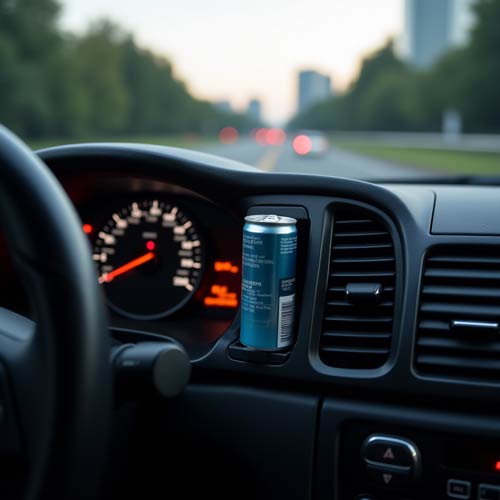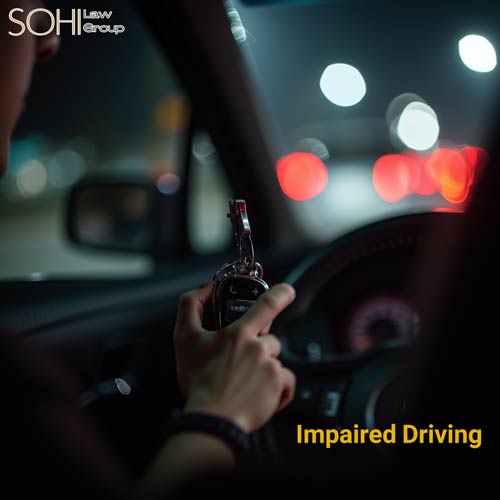Impaired driving charges in Surrey, BC are a serious legal and community issue. With Surrey consistently ranking among the top municipalities in British Columbia for impaired driving incidents, anyone facing a 90-day driving prohibition or criminal impaired driving charge needs to understand both the risks and their legal options. At Sohi Law Group, our Surrey impaired driving lawyers provide experienced guidance to help you navigate immediate prohibitions, roadside suspensions, and Criminal Code charges.
Impaired Driving Charges in Surrey, BC – Legal Considerations
Impaired driving is addressed under both the Criminal Code of Canada and the Motor Vehicle Act of British Columbia. Police officers may issue roadside prohibitions or recommend criminal charges depending on the circumstances. Because timelines for challenging prohibitions are short, it is important to understand the process and act quickly.
1. Understanding Impaired Driving Laws in BC
Impairment can result from alcohol, cannabis, prescription medication, or other substances that affect a person’s ability to operate a motor vehicle. British Columbia law sets out detailed procedures for roadside testing, administrative sanctions, and criminal proceedings. Even if no criminal charge is laid, administrative penalties such as immediate roadside prohibitions can still apply.

2. Potential Consequences
The consequences of an impaired driving incident may include roadside suspensions, mandatory fines, vehicle impoundment, and program participation requirements. If criminal charges are pursued and result in conviction, further penalties such as probation or jail may follow. These outcomes can also have practical effects on a person’s insurance, travel, and employment opportunities.
3. Administrative vs. Criminal Proceedings
Not every impaired driving allegation results in a criminal conviction. Some cases proceed through administrative processes only, such as Immediate Roadside Prohibitions (IRPs) or Administrative Driving Prohibitions (ADPs). Others may involve charges under the Criminal Code, which are handled in criminal court. Each type of proceeding has different procedures, timelines, and possible outcomes.

4. The Importance of Timelines
Deadlines for challenging prohibitions are short. For example, if you are served with a 90-day prohibition, you generally have seven days to request a review. Missing a deadline may affect your ability to contest the prohibition, so prompt action is essential.
5. Seeking Legal Advice
Every case is fact-specific. Consulting with a lawyer can help you understand the process, assess whether legal defences may be available, and make informed decisions about how to proceed. A lawyer can also assist with preparing review applications or representing you in court if charges are laid.
Confidential Consultation
If you wish to discuss your circumstances, you may contact Sohi Law Group:
833-877-9797
📧 [email protected]
Conclusion
Impaired driving charges in Surrey, BC, carry serious legal and personal consequences. Whether the matter involves an administrative prohibition or a criminal charge, understanding the process and acting within the required timelines is critical. Seeking legal advice can help you make informed decisions, understand your rights, and navigate the steps ahead with greater clarity.
Frequently Asked Questions (FAQs)
Q1. What is the difference between a roadside prohibition and a criminal impaired driving charge?
A roadside prohibition is an administrative penalty under the Motor Vehicle Act. A criminal charge is prosecuted in court under the Criminal Code. Both can result in driving suspensions, but only a criminal conviction creates a permanent criminal record.
Q2. How much time do I have to challenge a driving prohibition?
You generally have seven days from receiving a Notice of Driving Prohibition to apply for a review. Deadlines are strict, so it is important to act quickly.
Q3. Can prescription medication lead to an impaired driving charge?
Yes. If medication affects your ability to operate a vehicle safely, it may lead to an impaired driving allegation, even if it was legally prescribed.
Q4. What are some potential penalties for impaired driving in BC?
Penalties may include immediate licence suspensions, vehicle impoundments, fines, program requirements, and in some cases, jail. Insurance and employment may also be affected.
Q5. Do first-time impaired driving offences carry jail time?
Jail is not automatic for a first offence, but it is possible depending on the circumstances. Other penalties, such as fines and driving prohibitions, are more common.
Q6. Should I get legal advice if I receive a prohibition or charge?
Yes. A lawyer can explain the process, advise you of deadlines, and help you consider your legal options. Each case is different, and legal advice can help you make informed decisions.





[…] Impaired Driving […]